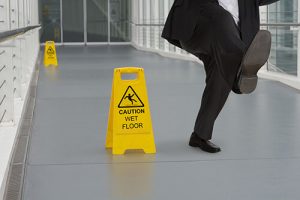Slipped and Fell at Work? What You Need to Know
Posted October 4th, 2016 by Anthony Carbone, PC.
Categories: Slip and Falls, Workers Compensation.
 We’ve talked a lot about slip and fall accidents. In Part V of our series, we go on to discuss how fall down accidents can represent more than premises liability claims. What happens to the person who slipped and fell at work? Who’s responsible?
We’ve talked a lot about slip and fall accidents. In Part V of our series, we go on to discuss how fall down accidents can represent more than premises liability claims. What happens to the person who slipped and fell at work? Who’s responsible?
Justine works as a secretary for a large Newark law firm. Their office takes up a few floors in a large high-rise building. On occasion, Justine needs to run up documents to another department. Sometimes, she waits for the elevator. It’s generally easier to take the hallway steps.
It came as a surprise. Justine was running up the stairs and had just reached the landing. Her feet suddenly gave way and she was thrown backward. Fortunately, Justine was able to somewhat catch her fall and didn’t tumble down the entire staircase.
Justine was in agony. Her back hit the cement blocks. She could feel the tears streaming down her face. She also noticed that her clothes were wet. She determined that something slippery was on the floor. Was that what made her slip and fall?
Not everyone who slips and falls at work has a premises liability claim. However, Justine’s attorney will want to investigate to see if one is feasible in this case. Since she was at work and injured during the course of her employment, Justine is entitled to workers’ compensation benefits. Learn how premises liability and workers’ compensation claims work together.
Slip and Fall Work Accidents: Possible Premises Liability Claims?
If you’re hurt at work, your employer should arrange for workers’ compensation benefits. This means payment for your medical bills and temporary disability benefits. You may also be eligible for a permanent partial or total disability award. You can read more about workers’ compensation benefits here.
There are very rare instances you can bring a premises liability lawsuit directly against your company. Since New Jersey is a no-fault state for workers’ compensation insurance, negligence claims against your employer are limited. Bottom line? You have to prove intentional harm.
That’s not to say someone else might not be responsible for your injuries. Or, that you can’t make a premises liability claim against them. In our sample case, Justine fell in the hallway stairs. Was Justine’s employer responsible for making sure the steps were clean? Did they control the area? Or, was it something the owner of the premises took care of?
An experienced slip and fall accident attorney will investigate the circumstances to determine the feasibility of a premises liability claim. This would be true in many other types of scenarios. For example, a retail store worker could fall while using the mall restrooms. A home inspector might trip and fall while out on a work assignment.
If a viable premises liability case exists, it is called a third party claim. This means that someone other than your employer bears responsibility for your medical bills and other benefits afforded to you under workers’ compensation laws. Your attorney will work with the workers’ compensation carrier regarding any lien they may assert for repayment.
Contact Us
At the Law Offices of Anthony Carbone, we handle both workers’ compensation and premises liability cases. If you have slipped and fallen at work, we have the experience and resources to assist you. Contact us to schedule an appointment.


